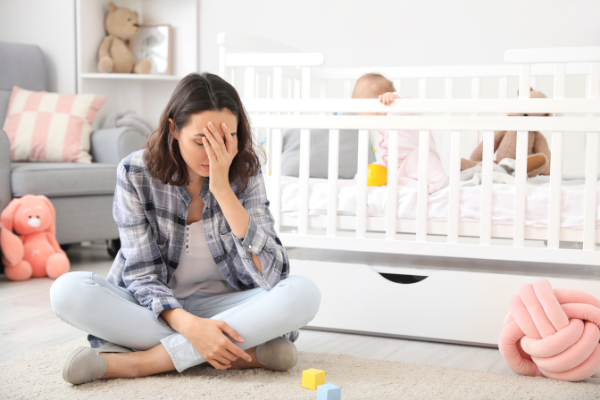
Chances are, as a new or expecting mother, you know about baby blues and postpartum depression. But did you know that postpartum anxiety and other anxiety-related disorders affect more than 15% of postpartum women? While every mother worries about their newborn and experiences stress, sometimes these concerns can negatively affect their life. Learn more about its signs, symptoms, causes, and treatment to help yourself or a loved one.
What Is Postpartum Anxiety?
It’s instinctual for mothers to worry about their newborn’s health, happiness, and care. You might have concerns like, is my baby crying too much? Are they feeding and getting enough nutrition? Are they breathing normally? But when this anxiety becomes all-consuming, it’s a different concern entirely.
Postpartum anxiety (PPA) is a type of perinatal mood and anxiety disorder that occurs after birth. It involves excessive worry that affects around 1 in 5 women, says Dr. Simas, a professor of obstetrics and gynecology, co-director of the Maternity Center, and medical director of Lifeline4Moms at the University of Massachusetts Medical School/UMass Memorial Health Care.
18 Symptoms of Postpartum Anxiety
A mother experiencing postpartum anxiety may experience a combination of physical and emotional signs and symptoms;
- Persistent unwanted thoughts
- Poor sleep
- Fear
- Overwhelm
- Chest pain
- Nausea
- Tension
- Fatigue
- Trembling
- Racing heart
- Panic attacks
- Irritability
- Decreased appetite
- Constant worrying
- Avoidance behaviors
- Trouble relaxing
- Feeling distracted
- Difficulty controlling emotions
What Causes Postpartum Anxiety?
Like other anxiety disorders and with the lack of research towards PPA, there are only theories that might make a mother prone to developing the condition;
- Hormonal shifts. After giving birth, hormone levels drop significantly making mothers more sensitive to stress, panic, and anxiety.
- Natural stress. Normal worries and concerns during pregnancy can worsen after birth and make mothers more sensitive.
- Biological factors. Past history of depression or anxiety can increase the likelihood of experiencing this condition.
Other risk factors include;
- Traumatic childbirth
- Premature baby
- Medical complications
- History of miscarriage
- Sleep deprivation
- Lack of support
- Domestic violence
- History of trauma or neglect
Postpartum Anxiety vs. Depression: What’s the Difference?
Postpartum depression (PPD) is another type of perinatal mood and anxiety disorder that mothers can develop post-birth. Some symptoms include persistent sadness, fatigue, feeling numb, irritability and restlessness, anger, and guilt.
While many of the symptoms overlap, the main difference is with PPD, mothers experience severe sadness, whereas mothers with PPA experience excessive worry. Some women may experience both conditions at the same time. They might feel sad and overwhelmed one day and experience excessive worry the next.
Thankfully, there are treatment options available to help mothers with either one or both of these disorders.
6 Treatment Options for Postpartum Anxiety
1. Seek support
Asking for help and receiving support is the first step to recovery. Reaching out to loved ones can provide assistance to give you time to relax. As a mother, it is tempting to neglect yourself for your baby. You probably don’t have a lot of time, and it can feel impossible to balance your life post-newborn. But talking to friends and family will provide necessary windows to shower yourself with love, care, and a much-needed break.
2. Connect with other mothers
You may feel like no one understands what you’re experiencing, but you’re not alone. Postpartum anxiety is common. Connect with other mothers through a parent support group or other mother groups to reduce feeling isolated, misunderstood, and overwhelmed. By hearing their experiences, you might find new ways of thinking, tips to help, and receive emotional support from those who understand more than anyone else.
3. Mindfulness
Yoga, meditation, deep breathing, and mindfulness techniques are all ways to reduce your anxiety levels. When your baby is napping, roll out your yoga mat and complete a few stretches, listen to a guided meditation, or if you’re short on time, complete a 3-step mindfulness exercise.
- Start by bringing your attention to how you’re feeling, thinking, and sensing. Notice your thoughts and feelings, but try to refrain from judging them.
- Next, focus on your breath in either six breath intervals or for one minute at a time. As you’re breathing, notice how your body responds. Be aware of your chest rising and falling, your ribs expanding, and the temperature of your breath.
- After observing your body, focus your attention on your environment. Notice any shapes, colors, or reflecting lights of any objects around you. Try to take this practice with you anytime you feel overwhelmed.
4. Self-care
Self-care is more than bubble baths, face masks, and manis. Spa days are great, but it involves paying attention to your needs and taking care of yourself. Finding time to invest in self-care after having a baby may feel challenging. But even 20 minutes a day can make a difference in your mood. For moms, a few suggestions include; eating a healthy meal, exercising, hydrating, hanging out with friends or family, and spending time on a hobby or passion.
5. Balance duties
You may try to do everything alone and feel guilty for not doing more – hello, hormones. But sitting down with your partner or spouse and dividing the duties can provide much-needed relief. Communicate what is happening and ask them for an extra hand. If this is not possible, ask your family members or friends for help, and consider hiring some part-time support.
6. Therapy
Cognitive behavior therapy (CBT) is the gold-standard therapy for treating anxiety. A psychologist or psychiatrist will help you recognize your triggers, change unhealthy thoughts and give you skills to cope with the stress and overwhelm. By learning how your thoughts can cause your anxiety, you will have more positive outcomes that impact how you view yourself, your relationships, health and your baby.
When to Seek Help
While it’s important to understand almost all mothers experience anxiety, those with severe postpartum anxiety should contact a doctor. How do you know if your anxiety is severe? Observe your symptoms, and notice if they are disrupting your functioning in areas of your health, relationships, and activities. Dig a little deeper, and ask yourself;
- Are my symptoms affecting my ability to take care of and bond with my baby?
- Do I have thoughts of self-harm or harming my baby?
- Are my symptoms worsening with time?
If you’re experiencing postpartum anxiety, it’s important for you to seek help. Dr. Simas advises, “Moms should turn to their obstetrician, their primary care doc, their therapist (if they have one), and their family and friends. She should keep reaching out until she gets the help she needs”.














































